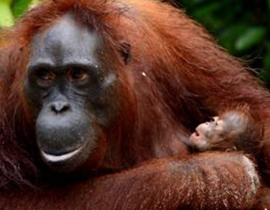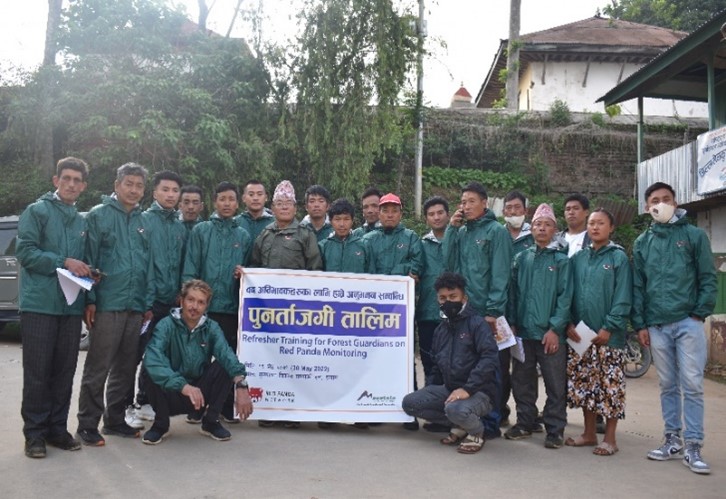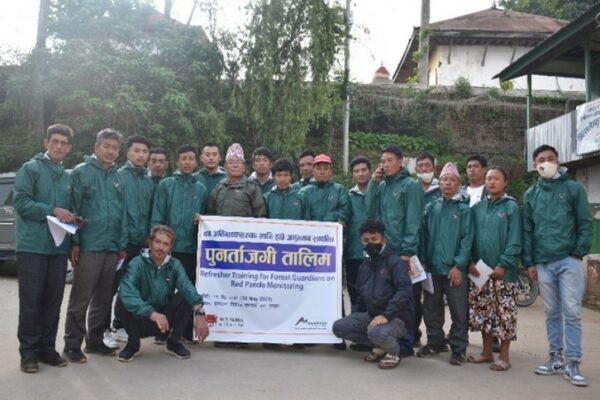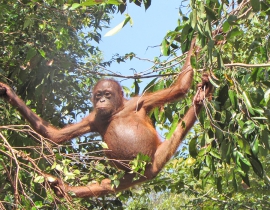Posted August 19, 2013 in All
Amoy, a female orangutan, who moved to the Lamandau River Wildlife Reserve ten years ago, has now settled down to life in the area and has recently had her first baby. This new baby reinforces the important work of the Orangutan Foundation. The sex of the baby is still unknown, but staff have named the new arrival Alex. The infant was around 2 weeks old when first spotted clinging to its mother’s neck at the beginning of July, and being so little it could barely lift its head. Staff will keep a close eye on Amoy and Alex over the coming weeks.
Another female, Luxi, was also seen looking for food, with an infant attached to her waist. The baby, named Luna, was 3 or 4 weeks old when first spotted. Luxi has been on the reserve since 2005 and both she and Amoy were released onto Camp Gemini, which seems to be the successful camp for helping the next generation in the forest. Sadly, last year, her first baby disappeared and nobody knew where or why. Now she looks healthy with a new infant and staff hope this baby will survive. Staff will continue to monitor her, making sure she gets the best feeding in order to produce good nutrition for the baby.
A few days after the news of the two births, Dr Wawan, the reserve vet, rescued a female orangutan from a rubber plantation. This female was reported to the team after villagers saw her eating rubber seeds and bark. It turned out the location of the orangutan is in fact a regularly visited area for passing orangutans. On the first day of trying to dart the orangutan, staff had little success, so instead the skilful staff observed the female and watched where she nested. This allowed the team to successfully dart her the next day. She was examined by Dr Wawan, who estimated, from the pattern of her teeth, she was 12-15 years old. Staff were happy to move this healthy individual, and she is now enjoying life on the Lamandau River Reserve.
In mid July, the Foundation team were called to a local palm oil plantation by the owner of the land, who wanted the team to relocate an orangutan that had been seen in the area. The farmer wanted the orangutan removed to protect the quality of the crop and nearby villages. Additionally, orangutans can be tempted into the nearby community and plantations by palm fruit, as well as the more popular pineapples, grown in the village gardens. The team pursued the orangutan until after sunset, and finally around 7pm the orangutan was successfully darted and taken in for a health check up. The individual was male and from the look of his teeth, around 9-11 years old. The Foundation’s vet commented that the individual was in a healthy condition and was still very wild. Having come straight from the wild and being in such good health, it was decided to release this orangutan as soon as possible. The Orangutan Foundation has been supporting the orangutan reintroduction programme in the protected Lamandau River Wildlife Reserve since 2000. It is one of the few places in Indonesia where translocated and rescued orangutans can be released into a protected area. On the 17th July, this male orangutan was successfully released in the area between Camp Gemini and Camp Siswoyo. This site was chosen because the water level of the river is still very high, allowing the release boat to access good release points. Video footage of the hard release can be found on the Orangutan Foundation’s blog page at http://www.orangutan.org.uk/blog/
Picture of Amoy and here infant Alex © Orangutan Foundation




